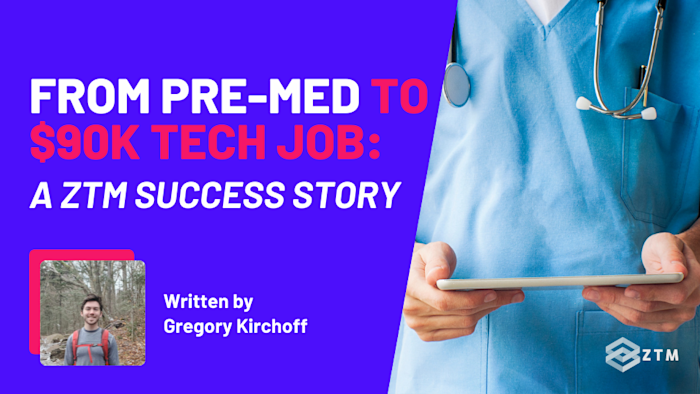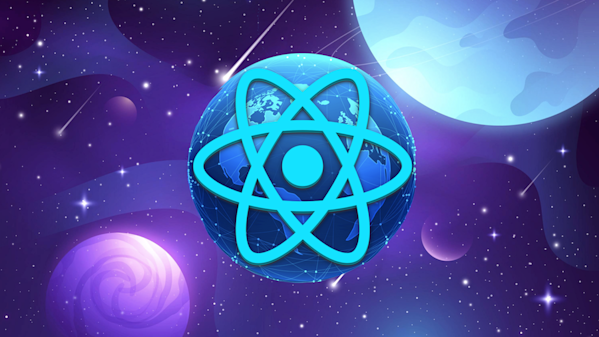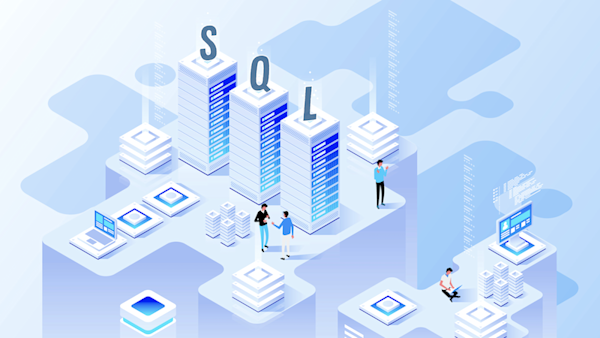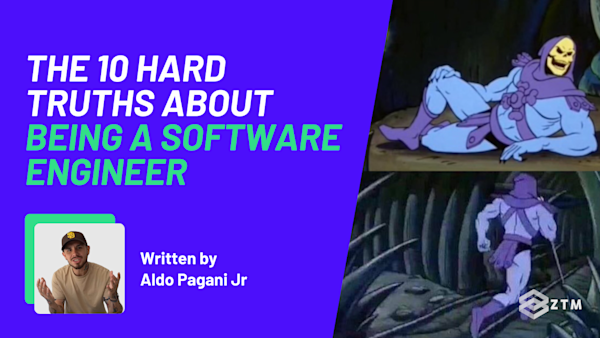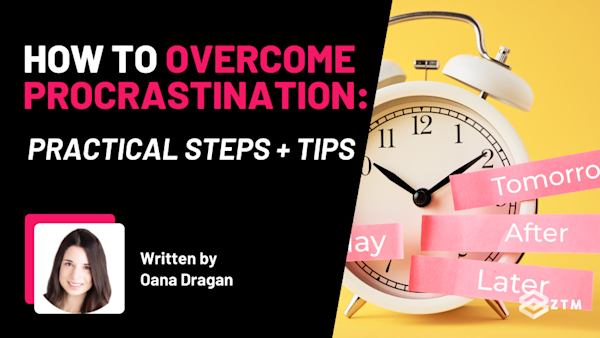A career in medicine seemed like the perfect path - until one ZTM student realized it wasn’t aligned with their life goals.
Faced with the prospect of multiple further years of schooling, debt, and a demanding lifestyle, and they made a bold decision to switch from premed to tech. Today, they’re thriving in a $90,000+ Software Engineering role.
How did they go from studying for the MCAT to leading innovative tech projects? It was a journey driven by self-reflection, strategic learning, and a determination to create a balanced, fulfilling life.
Let me introduce you to him, so he can tell you his story…
Meet Gregory

Hi, my name is Gregory Kirchoff, and I'm a Software Engineer at SiteSpect.

SiteSpect is an A/B testing platform focused on conversion rate optimization, allowing businesses to run tests and make data-driven decisions based on which variations of ideas or designs perform better.
My role primarily revolves around front-end development with React, though I do occasionally work on the back end as needed. In this role, I develop software solutions, collaborate with teams to design systems, and troubleshoot any issues that arise.
How long have you been working as a Software Engineer?
Editor’s note: Gregory has been in his role now for around 2 years. However, this interview was done a while back and got lost. I wanted to share the original version, as it shows his experience when first starting out. My bad Gregory! I also got to hear what he’s been up to recently, and I've added that so you can see his progress later in this article.
Anyways, back to Gregory.
I've been at my current company for about seven to eight months.
This relatively short time has been packed with learning experiences and challenges that have significantly contributed to my growth. The opportunity to apply theoretical knowledge in practical settings has been crucial for my development.
I’m really enjoying it, especially because of the supportive team environment, and it’s allowed me to achieve a much better work-life balance.
What did you do before you got your current job?
My journey into software engineering has been quite transformative, as I transitioned from a completely different field - and it's my first full-time career job!
Before this, I worked part-time in a medical lab, where I was responsible for organizing and processing samples. I quit that just before college so I could focus on my studies.

While this might seem unrelated, my background in the medical field gave me a unique perspective on problem-solving and attention to detail—skills that are essential in software development. The experience also honed my ability to analyze data and emphasized the importance of accuracy, which I now apply to my coding work.
To be clear though, my current job wasn't my first step into Software Engineering as a career.
After leaving the medical field, I spent 12 months at another software company that specialized in helping businesses transition from one version of software to another before the old tech became redundant.

While this role provided valuable experience and I was doing full-stack work, I couldn’t see a long-term future there due to the market cap on the service they offered. (There was a limited number of companies that would ever need this).
So, after about a year there, I managed to land my current role at SiteSpect.
What made you want to join ZTM?
Honestly, I was grappling with some big life questions and didn’t like the answers I was finding on my current path. I knew that I wanted a career that offered a fulfilling life, with financial security, free time, and the ability to balance work with personal passions. But the math just wasn’t adding up with the path I was on.
I had been focused on a career in medicine since high school, majoring in Microbiology and Immunology. I even scored well on the MCAT and realized that becoming a physician was within reach. But as I got closer to making that dream a reality, I started to question if it was truly the right path for me.
It hit me that my childhood dream was based on the ambitions of a five-year-old who didn’t fully understand what it meant to choose a career. When I looked ahead, I saw a long road of schooling, residency, and debt - another 8 years or more of my life that would pass before I could start living the life I envisioned. I realized that being a physician wasn’t compatible with the life I wanted: a family, a home, hobbies, and the time to enjoy them.
Adding to this, I had been working in a medical lab, earning just $12 an hour, spinning blood and urine samples. The reality of the medical field was setting in - it was brutal, with long hours and little financial payoff, especially for someone just starting out. I couldn’t see myself grinding through years of expensive schooling only to end up in a similar situation, possibly with a higher degree but still underpaid.
And so as I was approaching my senior year of college, I knew something had to change. Changing majors or starting over wasn’t an option, so I had to find a new direction that would still allow me to leverage my skills. That’s when I realized that tech was the best option. I wanted a career that was in demand, offered a good work-life balance, and allowed me to grow.
I joined Zero to Mastery (ZTM) to acquire the skills needed to make a successful transition into tech. I was looking for practical coding skills that would make me marketable in the job market, and ZTM provided a structured learning path that made complex concepts digestible.
During my senior year, especially with the shift to remote learning due to COVID, I dedicated myself to ZTM’s courses. I even found myself learning on two screens - I had my immunology class on one, and Andrei’s Web Development course on the other.
This dedication paid off, as I managed to graduate while also building the skills needed to break into tech.
TL;DR
My ultimate goal was to secure a position as a software engineer, which I’m proud to say I’ve achieved!
What other resources, courses, or sites did you consider?
FreeCodeCamp was a big one, although I wasn’t a huge fan of their interactive editor. Their YouTube channel, however, is fantastic for staying updated on tech news. Fireship’s YouTube channel also stood out to me as an excellent resource for learning about the latest trends in tech.

I also took Jonas Schmedtmann’s courses for CSS and back-end development, especially since ZTM didn’t have a back-end course at the time.
Editor’s note: This was 3 years ago. We now have multiple back-end courses for you to learn from 😉.
What was your previous level of coding experience?
Absolutely zero. In high school, I had friends who were into computers, and I honestly thought programming was just about ones and zeros.
It wasn't until I started Andrei's course and did some research that summer before my senior year that I realized programming is more about logic than math. It's not some abstract, math-heavy thing; it’s about if-then statements and logical processes that make sense once you get the hang of it.
When you joined, were there any difficulties?
Not really. Everything went pretty smoothly. Whenever I encountered a problem, the Discord server was a great resource. Any bumps in the road were easily smoothed out with the support available.
What was your learning experience like?
My experience was probably a little different in that I was often watching two videos at once - my college lectures on one screen and Andrei's course on the other.
That being said, I didn't have any issues.
One thing that really stood out to me though was the practical, marketable approach of ZTM's courses. Andrei's teaching wasn’t about flashy new trends, or wasting time learning things that were not needed. It was about what actually works in the industry.
For example
While MongoDB is trendy, Andrei emphasized the importance of SQL and PostgreSQL because that's what most companies actually use.
And sure enough, my first job involved React, Express, Node.js on the back end, and PostgreSQL for the database.
This meant that everything I was learning in the course, I needed for my role. So it was refreshing to learn skills that were immediately applicable in the real world.
Did you have any hesitations or doubts when you were going to sign up?
Not really. The academy is affordable so there was very little risk involved. Plus, you can always get a refund if you're not satisfied, though I never needed to do that.
Online reviews and course previews made it easy to see what was covered, so I felt confident in my choice.
What steps did you take to get hired?
I started Andrei's course in September or October of 2020, during my senior year of college. I then graduated in May 2021 and began applying for jobs around July or August, and started my first role in September.
So it took about nine to ten months of studying while also being a full-time student, and then 1-2 months before getting hired.
It's wild to think that I spent four years in university, unsure of what job I could land with my degree, and then within ten months and less than $300 of online courses, I secured a job - entirely due to those online courses…

Is there a big difference in earnings in this new role from what you made before?
Absolutely. During high school and college, I worked in a medical lab for $12 an hour and in EMS for about $14.50 an hour, mostly as a volunteer. (I actually made more money selling cheese at a Farmers Market!).
Wheras my first job in tech started at $76,000 a year, and my second bumped up to $90,000, just a year later. The difference is night and day.
How do you feel now that you have this new position?
I feel a sense of accomplishment and excitement in my new role.
It has been rewarding to see my hard work pay off and to be part of a dynamic team that values innovation and collaboration. The challenges I face daily push me to grow and develop my skills further, and I am enthusiastic about the future possibilities in my career.
I feel confident also. Thanks to the quality of the courses, I don't feel super, super green compared to everybody. It's actually incredible that I'm going toe to toe with people who have been working for 5–10 years.
In fact, I'm helping my team modernize from really old, sort of Perl-based systems to using React and starting everything new!
It’s interesting because I’m kind of leading the team in a lot of ways—teaching them good component design, showing them libraries, and teaching them about component testing.
Such a weird experience to be in, where it feels like I didn’t know anything a year ago, and now I’m kind of like teaching people things, code-reviewing people.
It's a lot of fun though and I'm really enjoying it.
What advice would you give to other students, who are thinking of becoming Software Engineers?
Build your own projects and get more experience!
The great thing about Software Engineering and tech in general, is that you can build your own experiences through projects.
You can create tangible, showcasable work and fill your resume with it. This is particularly powerful if you leverage your unique background to create standout projects. (More on these in a second).
What should you build?
You can create your own custom projects, but you can start even easier and just customize tutorials.
For example
After following a tutorial on building a social media app on YouTube, I combined it with knowledge from the Data Science and Machine Learning course to create a unique app that only allows users to post photos of cats.
This was one of the portfolio projects I had on my resume and helped me get hired.
It involved:
- Some problem-solving, like retraining the TensorFlow model that was trained on dog breeds to work with cats vs not cats
- Finding out how to download and label all the photos I needed from places like Kaggle
- And then how to get the model to work outside of Google Collab
But because much of the foundation was already there, it wasn't too hard to tweak and blend things together to make a standout project that I was requested to detail in multiple job interviews.
What projects have you been working on recently?
Editor’s note: When I caught up with Gregory to apologize for this interview going missing, I got to pick his brain about what he’s been up to. It’s some seriously impressive work!
Anyways, back to Gregory.
Here are a few highlights, but be sure to check out my GitHub profile, or website.

I’ve mainly been combining my biology background with dev skills, to work and create some interesting projects.
#1. Evolution Simulator

This is a project that simulates evolutionary processes, allowing users to explore how different factors impact the evolution of species.
#2. Bee Dance Translator

This tool translates the intricate dance patterns of bees into a visual format, helping users understand how bees communicate.
Waggle waggle!
#3. Peer to Public

This is a scientific communications site, designed to bridge the gap between complex research and public understanding, particularly focusing on Long Covid and SARS-CoV-2.
The platform allows readers to interact with data, tweak simulations, and models, and gain a better understanding of the topics.
I’ve also been writing content for my own blogs and sites:
- Understanding Cumulative Risk: This is an interactive article that teaches the statistics of cumulative risk, allowing users to adjust the math and see how it aligns with real-world data
- The Danger of Underestimating Delayed Onset Diseases: This piece explains how certain diseases and conditions, like smoking, don't cause problems immediately but rather with a delay
And he’s still learning!
I'm still going with ZTM three years after getting my first job! I’m currently learning PyTorch and LLMs and am planning on learning AWS and mobile development in the future. I want to stay sharp and be open to any future expected and unexpected career developments.
I actually took the Data Science and Machine Learning course from Dan Bourke and didn’t use any of the skills for a couple of years.
However, when I started working with scientists for my sci-comms site, being familiar with Pandas and NumPy was suddenly something I became super thankful for, as that’s how I do a good amount of my data manipulation and analysis!
So what are you waiting for? Take the next step in your career today!
Thinking of starting a career in Software Engineering, but not sure where to start?
Well, why not take the exact same courses as Gregory?
Once you join, you have access to every course in the Zero To Mastery Academy library, so that’s every course in this article and many more.
Not only that, but you’ll also get access to the ZTM private Discord community, where you can ask questions from your course teachers and chat with other students, working Software Engineering professionals, and freelancers!
It’s never too late to start a new career. There’s nothing to lose and everything to gain, so get started today.
